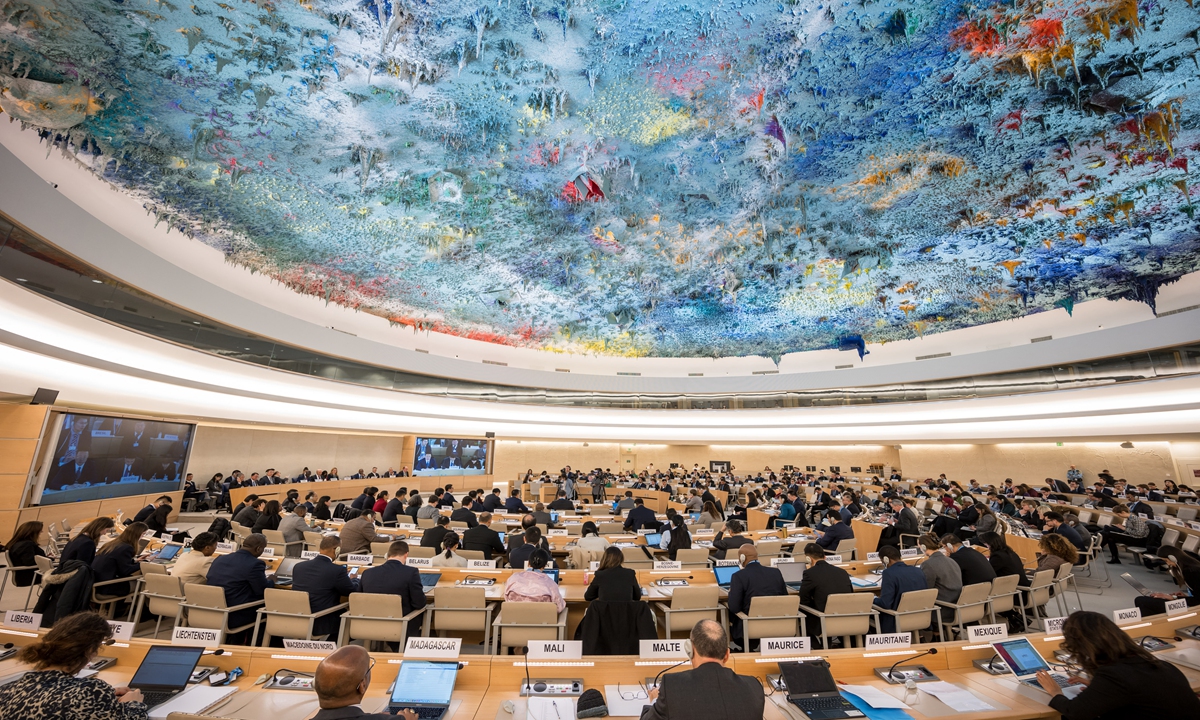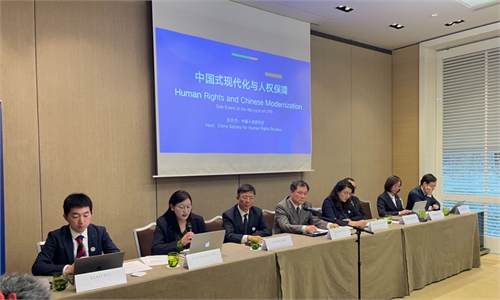Majority of countries affirm China’s human rights progress during 4th UPR, defying attack from US, West

A picture taken on January 23, 2024 shows the United Nations Human Rights Council during the review of China's rights record at the UN Offices at Geneva. Photo: AFP
Editor's Note:
On Tuesday, the UN Human Rights Council conducted the fourth round of Universal Periodic Review (UPR) on China's human rights situation at the Palais des Nations in Geneva. Global Times reporter Fan Lingzhi observed the meeting on Tuesday and found that despite the intensified collusion of anti-China forces inside and outside the venue to smear and attack China's human rights situation, they were unable to change the fact that the majority of countries highly praised China's improvement in human rights conditions.
The fourth UPR on China, which started on Tuesday, has gained a lot of attention. China submitted a national report to the Human Rights Council in accordance with relevant procedure and more than 160 countries have submitted requests to speak during the interactive session.
According to procedure, during the review, the country under review first gives a brief introduction, followed by other countries asking questions, making comments and providing suggestions during the interactive dialogue session. Finally, the country under review gives a summary response.
UPR serves as a crucial platform for countries to engage in equitable and candid discussions on human rights matters within the framework of the UN, fostering constructive dialogue and collaboration. China participated in previous reviews in 2009, 2013 and 2018.
The Global Times reporter saw that an hour before the review began, there was already a long queue in front of Room XX of the Palais des Nations. Even after the review started at 9 am, more people were still lining up.
The security guards at the entrance kept reminding everyone that the seats inside are already full, which was different from the relatively calm situation the day before - during the country review on Monday, journalists and NGO attendees could enter at any time, and there were plenty of empty seats inside.
The Global Times reporter also learned that some anti-China organizations have long been eager to take advantage of the heat of the human rights review. Some individuals from organizations such as the "World Uyghur Congress" (WUC) were also present.
Some anti-China organizations that were unable to enter the venue did not give up and attempted to enter the venue by pulling a few strings with the working staff.
Affirming China's efforts
According to the report submitted by China, the Chinese government accepted 284 out of the 346 recommendations proposed by various countries during the third round of the UPR in 2018. The report detailed China's commitment to respecting and safeguarding human rights as an important part of governance, as well as the achievements and practices in promoting and protecting human rights.
The words such as "we warmly welcome the Chinese delegation" and "thank the Chinese delegation for the comprehensive national report" were frequently heard during the review on Tuesday. Most countries praised China's progress in areas such as poverty alleviation, protection of women's rights and social security systems.
Despite China's impressive work, there are still voices that ignore the facts as a few Western countries, led by the US, continued to present so-called "recommendations" based on false information regarding China's Xinjiang, Xizang regions and the Hong Kong Special Administrative Region. Their statements sounded like "reading from a script" just to get the task done, which showed how little they knew of the development in these regions.
Chen Xu, head of the Chinese delegation for the review and also permanent representative of China to the UN office at Geneva and other international organizations in Switzerland, said in his concluding remarks at the Tuesday meeting that the active and enthusiastic speeches by representatives of various countries demonstrated how much they care about China's human rights cause.
The vast majority of countries adhere to the principles of objectivity, transparency, non-selectivity, non-confrontation and non-politicization, and actively affirm China's unremitting efforts and great achievements in promoting and protecting human rights, which China highly appreciates and is willing to strengthen exchanges and mutual learning with China in the field of human rights, Chen said.
On doubts arising from misunderstandings or false information, the ambassador noted that China is willing to continue engaging in equal, friendly dialogue and communication with relevant countries to build trust, clarify doubts and deepen mutual understanding.
"At the same time, we regretfully note that some countries have disregarded the facts and truth in their speeches, making baseless accusations and smearing China based on ideological bias and unfounded rumors. This clearly goes against the purpose and principles of the UPR," Chen said.
"We hope that these countries will stop politicizing human rights issues and instead adopt a comprehensive, objective, and fair attitude to evaluate the development of China's human rights cause, uphold the authority of the UPR, and inject positive energy into dialogue and cooperation in the field of international human rights," the ambassador said.
This year's UPR on China's human rights development once again demonstrates China's global influence and also showcased the international community's attention and expectations toward China, said Chinese scholars who attended the Tuesday meeting.
Constructive suggestions
Dai Ruijun, a member of the China Society for Human Rights Studies and a researcher at the Institute of International Law of the Chinese Academy of Social Sciences, noted that during the review, most countries affirmed the efforts made by the Chinese government to prioritize the people and promote the rights of all Chinese people. They also put forward a large number of constructive suggestions for China to further improve its human rights protection.
Developing countries also recognized China's efforts to enhance the speaking rights and influence of developing countries in the UN human rights mechanism and promote the healthy development of the UN human rights mechanism, Dai said.
In response to the unfounded accusations regarding Xinjiang, Xizang, and HKSAR made by the US and a few other countries, Dai said that he hoped the UPR can uphold its original intention of rejecting selectivity, politicization and double standards.
The UPR should promote dialogue and cooperation, and truly become a platform for countries to share good practices in human rights protection and put forward constructive suggestions to enhance the level of human rights protection, Dai said.

